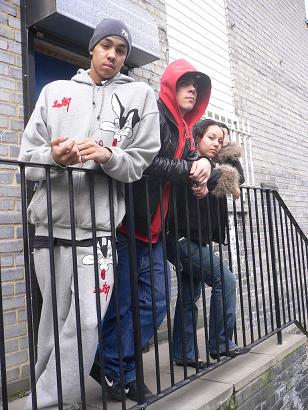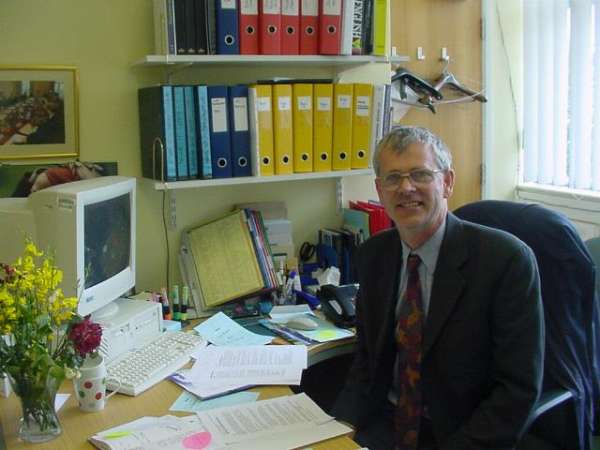
By Olivia Margo and Eddy Canfor-Dumas
This is the story of a failing school that is failing no longer. Why? Because when things reached rock bottom the head teacher took a bold step and brought in a team of conflict experts to transform the myriad disputes that were scuppering all attempts to teach and learn.
Headteacher Alasdair Macdonald describes Morpeth School in East London when he took over in 1991:
'Morpeth School is situated in Bethnal Green in Tower Hamlets and in the early 1990s went through a period where violence and conflict, heightened by racial tension, were preventing pupils from achieving anywhere near their potential. Exam results were among the poorest in the borough and, although there was a committed staff team, so much energy was required to maintain some semblance of order that morale was low and falling. A near-riot in the summer of 1993 in a local shopping area prompted the management of the school to look at ways in which they could move from being reactive to taking up a more pro-active stance.'
He brought in a pioneering group that had been established in 1987 to work on conflict transformation with young people, called Leap Confronting Conflict.
Part of Leap's theory of working is the need to prepare the ground for change, which means researching the context of the conflict and working openly and cooperatively with partners.
So they began with a 'conflict audit' of Morpeth: a piece of research using focus groups, interviews and questionnaires. This maps the levels and nature of conflict experienced and assesses how it's dealt with. A cross-section of the school is invited to take part in this process, including governors, parents, students and non-teaching staff, providing valuable information and recommendations to senior management and governors.
At Morpeth School, Leap found that young people felt upset, scared, angry, distracted and depressed about conflict. There seemed to be a general feeling of isolation and some sense of 'them and us' within the school, with all groups ready to apportion blame - it's the parents, the right-wing British National Party, the teachers and so on.
Amongst pupils, responses to conflict ranged from retreat to retaliation and revenge. Pupils also expressed the view that the school only dealt with conflicts between pupils and not those which arise between staff and pupils or between members of staff.
Teachers said they felt constantly criticised and judged, unsupported and under-valued. For many pupils and staff, fear of conflict and the lack of skills for dealing with it meant that there was very little intervention in the process of escalation.
Leap believes that conflict is inevitable in the lives of young people, and that what is important is to enable them to deal with it in ways which are constructive and creative rather than destructive and harmful. It also believes in the importance of teaching conflict-management skills directly to young people, as well as giving them specific roles in which to practise their skills.
In order to do this, the training at Morpeth School was based on a Peer Facilitation model. This means that young people are trained not only to manage their own conflicts more effectively, but to facilitate workshops for their peers as well. One of the biggest contributing factors to young people's behaviour and learning is the behaviour of their peer group; this programme harnesses the strength of peer effects.
Each tutor group in Year 10 (14 and 15 years old) attends a one-day workshop, from which Leap and the school selects twenty students to train as Peer Facilitators. These students continue their training on a three-day residential course where they learn the skills and techniques to disseminate their learning to their peers through similar workshops.
The training style is lively, engaging, challenging, rigorous and fun. Leap uses drama exercises, games, image work and facilitated large and small group work as a way of teaching useful frameworks for understanding conflict and our part in it.
The process is not quick but it is effective. In 1997, headteacher Alasdair Macdonald noted:
'It is now three years since the programme began, a period which has seen enormous change at Morpeth. The school has undergone a major transformation. Levels of conflict and violence have been reduced dramatically and exam results have improved so much that we were ranked fourth in the entire country in terms of improvement over a three-year period.'
Fast-forward nine years, to November 2006.
Leap's follow-up research found more than one pupil using the word 'privileged' to describe how they felt about being at Morpeth School. Given the location and demographics of the pupil population in Tower Hamlets, this is quite extraordinary. Students reported that they were extremely happy to be at Morpeth and expressed a very high regard for the school: 'It's the best school in the borough'; 'Deep down I'll always love Morpeth School'.
Relationships between staff overall were extremely positive: 'There's a lot of harmony'; 'We support each other'; 'I find the place warm and welcoming'; 'really good positive relationships'. Leap also reported that the Senior Management Team were excellent role models for staff and pupils in how to manage conflict and challenging behaviour with skill and respect, as were the Heads of Year. Staff and pupils show a huge amount of respect for one another. Continuing to develop meaningful interactions and relationships year on year at Morpeth is a significant success, particularly in light of the diversity and difference that exists in the wider community.
In addition to parents now queuing up to get their children into Morpeth, external evaluations have shown:
- a positive change in school culture and ethos;
- a significant reduction of high-level conflict previously experienced by both young people and staff, with bullying less likely to escalate into physical violence;
- staff feeling less threatened by conflicts when they do occur and more confident in dealing with them;
- greater self-confidence among young people to take responsibility for their behaviour and achievement;
- an increase in annual attendance rates year-on-year since 1995 [one year after work began with Leap];
- a fall in the number of permanent exclusions since 1995/6;
- general improvement in GCSE examination results year-on-year since 1996
These conflict transformation programmes are not one-hit-wonders. Cultural shifts can begin to take place early on, but the most impact is seen when the learning is embedded in the school’s culture and ethos. These programmes are a crucial part of the social and educational journey of learning that every young person experiences.
But the results are there for everyone to see. This is what the school's OFSTED report said last year:
'Morpeth School is larger than average, oversubscribed and serves an area of significant socio-economic deprivation. It has specialist status for the arts. Its students come from a wide range of ethnic backgrounds with those of Bangladeshi heritage forming just over half of the school‘s population. A high proportion of the students speak English as an additional language. The proportion of students who have learning difficulties and/or disabilities is higher than average and the proportion with a statement of special educational need is very high.'
Overall effectiveness of the school: Grade 1
‘Morpeth is an outstanding school.’
And in the 2008 New Year's Honours List Alasdair Macdonald was knighted – no wonder he's smiling.

Clearly, the turnaround at Morpeth is the result of years of hard work by all those involved with the school - staff, pupils, parents and the local authority. But the crucial intervention was the role of Leap in teaching everyone there how to manage conflict positively.
So if it can work for a school like this, why aren't similar programmes in place up and down the country? Surely it's a better way to spend precious resources than simply equipping difficult schools with expensive security scanners. What's that going to solve?
This article is based on an original report supplied by Leap.
